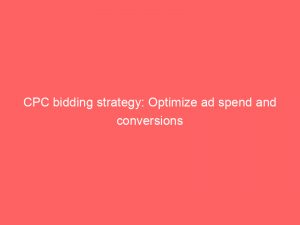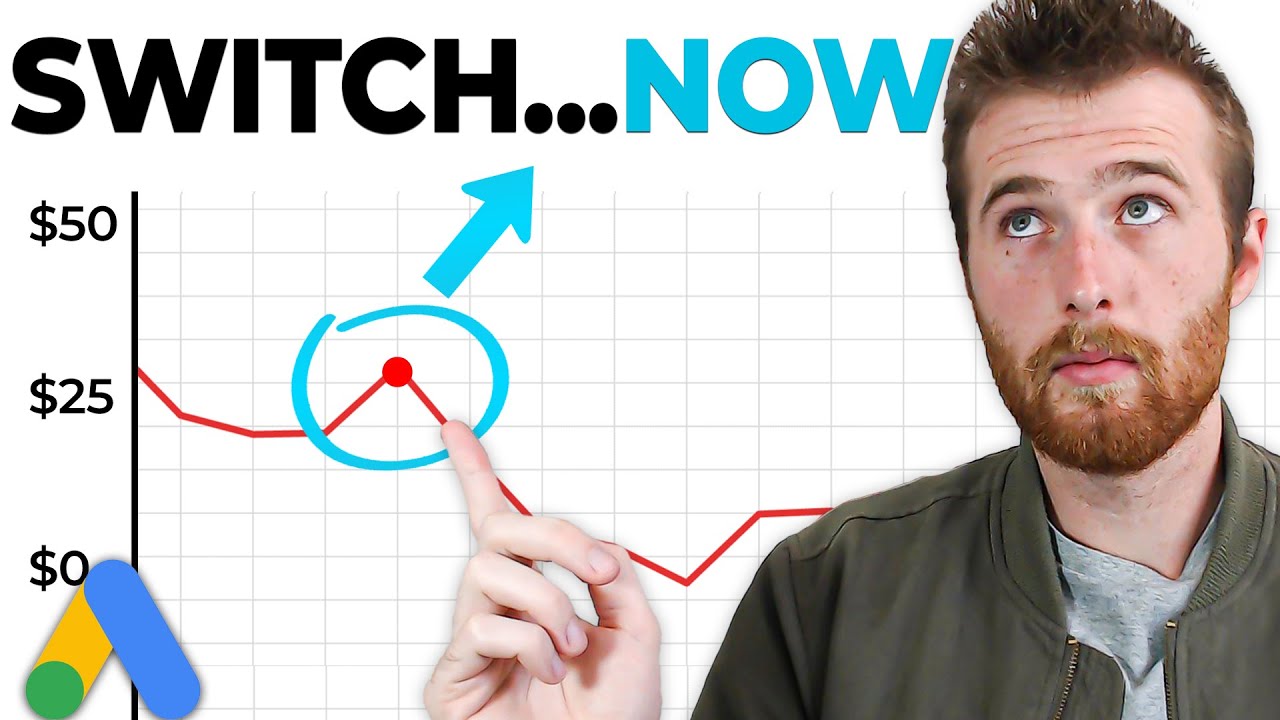- cpc bidding strategy
- 1. Manual CPC Bidding for Maximum Control Over Ad Costs
- 2. Setting Customized Bids for Keywords and Placements
- 3. Allocating Budget Strategically to Profitable Keywords
- 4. Using Manual CPC to Set Maximum Cost-Per-Click
- 5. Maximizing Clicks with Automated Maximize Clicks Bid Strategy
- 6. Setting Default Bids for Entire Ad Group
- 7. Tailoring Bids for Individual Keywords or Placements
- 8. Budget Optimization with Manual CPC Bidding Strategy
In the fast-paced world of online advertising, the key to success lies in finding the perfect biddingstrategy. Enter CPCbidding, a powerful method that allows advertisers to take control of their costs and budgets.
With manual CPC bidding, advertisers set their maximum cost-per-click, giving them the power to optimize their spending and budget according to their specific goals. But wait, there’s more!
For those seeking even greater convenience and efficiency, there’s Maximize Clicks—a game-changing automated option that maximizes the number of clicks within a given budget. Join us as we delve into the exciting world of CPC bidding strategies and discover how to make every click count.
| Item | Details |
|---|---|
| Topic | CPC bidding strategy: Optimize ad spend and conversions |
| Category | Marketing |
| Key takeaway | In the fast-paced world of online advertising, the key to success lies in finding the perfect bidding strategy. |
| Last updated | December 28, 2025 |
cpc bidding strategy
CPC bidding strategy refers to the approach advertisers take to determine the maximum cost-per-click (CPC) they are willing to pay for their ads. With manual CPC bidding, advertisers have control over setting their own maximum CPC for ads, allowing them to actively manage and allocate their budget effectively.
This strategy enables advertisers to set a default bid for the entire ad group and separate bids for individual keywords or placements. By doing so, they can prioritize and allocate more budget to profitable keywords, maximizing their return on investment.
Furthermore, the Maximize Clicks bid strategy offers an automated option that sets bids to maximize the number of clicks within a given budget.Key Points:
- CPC bidding strategy involves setting the maximum cost-per-click advertisers are willing to pay for their ads.
- Manual CPC bidding gives advertisers control to set their own maximum CPC for ads.
- This allows advertisers to effectively manage and allocate their budget.
- Advertisers can set separate bids for individual keywords or placements, prioritizing profitable ones.
- The strategy helps maximize return on investment.
- The Maximize Clicks bid strategy automates bidding to maximize the number of clicks within a budget.
Sources
https://support.google.com/google-ads/answer/2390250?hl=en
https://www.callrail.com/blog/cpc-keyword-bidding-strategies
https://bixeltek.com/manual-cpc-bidding-strategy/
https://www.wordstream.com/blog/ws/2018/12/19/google-ads-automated-bidding
Check this out:
💡 Pro Tips:
1. Use automated bidding strategies to optimize your CPC bids: While manual CPC bidding gives you control over your maximum CPC, consider utilizing automated bidding strategies like Target CPA or Target ROAS to optimize your bids based on your campaign objectives. These strategies use machine learning algorithms to adjust bids dynamically and maximize conversions or revenue.
2. Segment your ad groups to fine-tune your CPC bids: Instead of setting a default bid for your entire ad group, consider segmenting your keywords or placements into smaller, more targeted ad groups. This allows you to set separate bids for each segment, ensuring that your budget is allocated more precisely to the keywords or placements that are driving the best results.
3. Utilize ad scheduling to adjust your CPC bids based on time of day: Monitoring the performance of your ads at different times of the day can provide valuable insights. By using ad scheduling, you can adjust your CPC bids to increase or decrease bids during specific time periods when your ads perform exceptionally well or underperform. This helps to optimize your ad spend and maximize the effectiveness of your campaigns.
4. Leverage audience targeting to adjust your CPC bids: Take advantage of audience targeting options such as demographics, interests, or remarketing to refine your CPC bidding strategy. By analyzing the performance of different audience segments, you can adjust your CPC bids to allocate more budget towards audiences that have a higher likelihood of converting, leading to more efficient ad spend.
5. Regularly evaluate and adjust your CPC bids based on performance data: Monitoring and analyzing the performance data of your campaigns is crucial for optimizing your CPC bidding strategy. Regularly evaluate the click-through rates, conversion rates, and costs associated with each keyword or placement. Based on this data, make data-driven decisions to increase or decrease your CPC bids to maximize your return on investment (ROI).
1. Manual CPC Bidding for Maximum Control Over Ad Costs
In the world of online advertising, it is essential for advertisers to have complete control over their ad costs.
Manual CPC bidding is a powerful tool that allows advertisers to set their own maximum cost-per-click (CPC) for their ads. With this strategy, advertisers can determine the exact amount they are willing to pay for each click, giving them full control over their budget and ensuring they don’t overspend.
This post updated with new ad network performance data.
By opting for manual CPC bidding, advertisers have the flexibility to adjust their bids based on the effectiveness of their campaigns, allowing them to optimize their ad spend and achieve the best possible return on investment (ROI).
2. Setting Customized Bids for Keywords and Placements
One of the key advantages of manual CPC bidding is the ability to set customized bids for specific keywords or placements.
Advertisers can allocate more budget to keywords that have proven to be profitable, allowing them to maximize their reach and conversions. With this level of control, advertisers can prioritize their resources and bid higher on keywords or placements that are likely to generate the desired results.
By tailoring their bids to match the value of each keyword or placement, advertisers can ensure that they are obtaining the best possible ROI from their advertising efforts.
3. Allocating Budget Strategically to Profitable Keywords
Manual CPC bidding enables advertisers to strategically allocate their budget to the keywords that are producing the most profitable outcomes.
By closely monitoring the performance of each keyword, advertisers can make data-driven decisions on where to allocate their resources. They can increase bids on successful keywords to maximize their exposure and convert more users, while reducing bids on underperforming keywords to minimize wasted ad spend.
This strategic approach allows advertisers to optimize their budget and focus their efforts on the areas that will generate the highest returns.
4. Using Manual CPC to Set Maximum Cost-Per-Click
With manual CPC bidding, advertisers have the flexibility to set a maximum cost-per-click that aligns with their advertising budget and goals.
This allows them to control their expenses and ensure they do not exceed a certain threshold. By setting a maximum CPC, advertisers can effectively manage their costs and prevent any unexpected expenses.
Manual CPC bidding provides peace of mind to advertisers by giving them a say in how much they are willing to pay for each click, putting them in complete control of their ad spend.
5. Maximizing Clicks with Automated Maximize Clicks Bid Strategy
For advertisers who prefer a more hands-off approach, there is an automated bidding strategy called “Maximize Clicks.” This strategy sets bids automatically to maximize the number of clicks within a specified budget.
With Maximize Clicks, advertisers can take advantage of Google’s powerful algorithms to optimize their bids and drive as much traffic as possible to their website. While this strategy may not provide the same level of control as manual CPC bidding, it can be a convenient option for advertisers who want to focus on increasing their website traffic and brand exposure without getting into the nitty-gritty details of bid management.
6. Setting Default Bids for Entire Ad Group
In addition to setting customized bids for individual keywords or placements, manual CPC bidding allows advertisers to set a default bid for their entire ad group.
This default bid acts as a baseline for all keywords and placements within the group. Advertisers can use this default bid to establish a consistent bidding strategy across their campaigns and maintain a certain level of visibility in their target market.
By setting a default bid, advertisers ensure that all keywords and placements receive at least a minimum level of exposure, while retaining the flexibility to adjust bids on a more granular level.
7. Tailoring Bids for Individual Keywords or Placements
To achieve optimal results, advertisers can further refine their bidding strategy by tailoring bids for individual keywords or ad placements.
This level of customization allows advertisers to adapt their bidding based on the performance and potential of each specific element within their ad campaign. By closely monitoring the performance of each keyword or placement, advertisers can make informed decisions on whether to increase or decrease their bids.
This fine-tuning ensures that advertisers are efficiently allocating their budget to the keywords and placements that are most likely to drive conversions and maximize their ROI.
8. Budget Optimization with Manual CPC Bidding Strategy
Ultimately, the goal of any advertising campaign is to optimize the budget and achieve the highest possible return on investment.
Manual CPC bidding provides advertisers with the tools and control they need to effectively manage their ad spend and maximize their conversions. By setting customized bids, allocating budget strategically, and utilizing default bids and tailored bids, advertisers can ensure that their budget is being utilized efficiently.
As a result, they can achieve the desired outcomes, whether it’s increasing sales, generating leads, or driving traffic to their website.
In conclusion, manual CPC bidding is an essential strategy for advertisers who wish to take control of their ad costs and optimize their ad spend. By setting customized bids, strategically allocating budget, and utilizing advanced bidding options, advertisers can maximize their conversions and achieve their advertising goals.
With the flexibility and control offered by manual CPC bidding, advertisers can make data-driven decisions and stay ahead in an increasingly competitive online advertising landscape.
Programmatic Advertising • Performance Marketing Tips • Self-Serve DSP Platform











